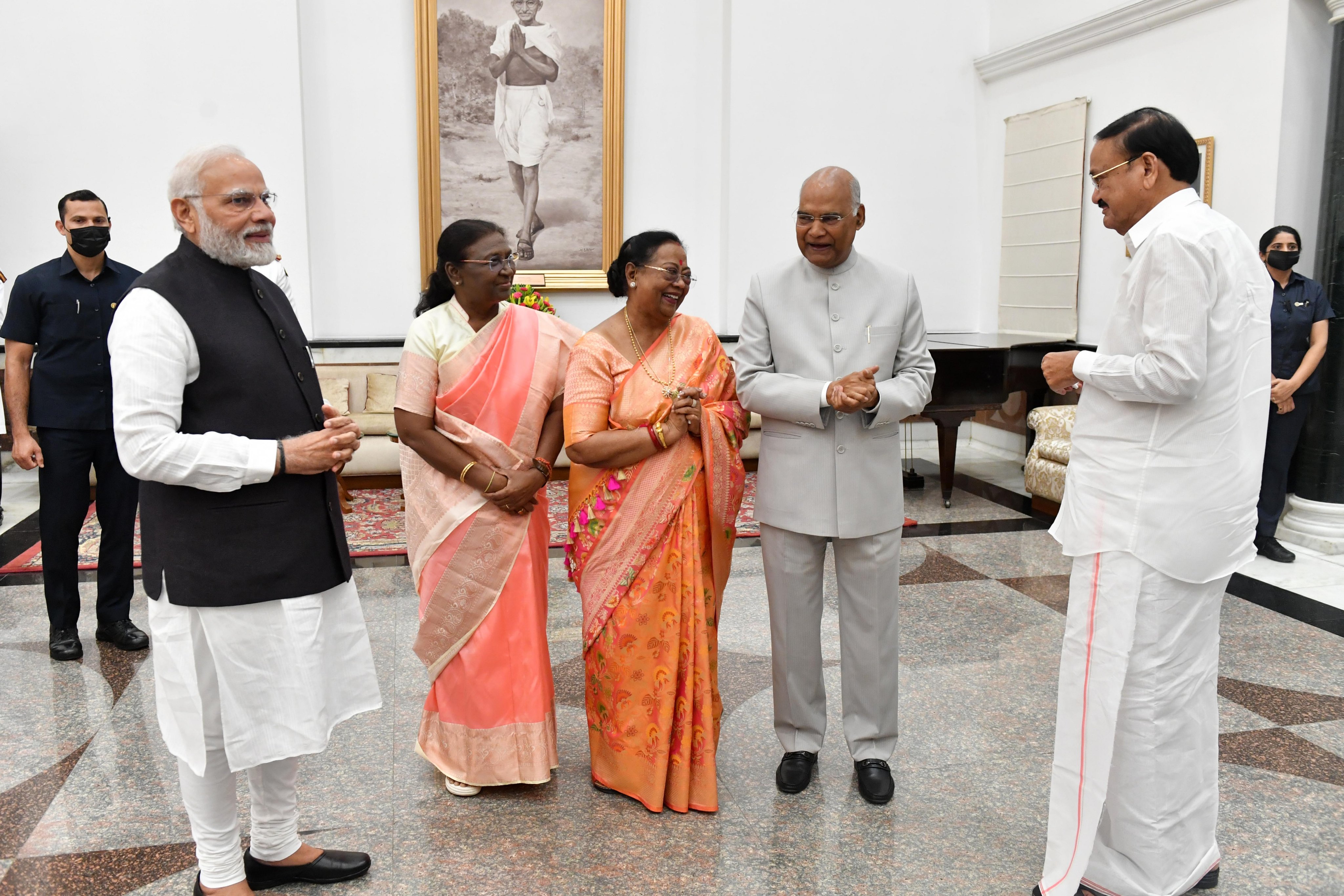Droupadi Murmu took the oath of office as the 15th President of India on Monday 25th July. A woman politician from the tribal (Janjatiye) community will be head of the Indian Republic for the very first time.
The ceremony of the assumption of office took place in the Central Hall of the Indian Parliament. Ms Murmu was escorted by Indian Prime Minister Narendra Modi, Vice-President and Chairman of the Rajya Sabha M Venkaiah Naidu, and Lok Sabha Speaker Om Birla to the Central Hall.
Oath of office to Droupadi Murmu was administered by the Chief Justice of India NV Ramana.
On July 22, the former Jharkhand governor Murmu registered a historic win over her rival Yashwant Sinha in the Presidential election, becoming the first woman tribal candidate and the second woman in the country’s history to occupy the highest office in the country.

Social media is flooded with congratulatory messages like, “It is a historic movement for India to elect the first member of the tribal (Janjatiye) community as President of India.”
Why shouldn’t we be proud of Mrs Droupadi Murmu’s election? questions Vikas Reddy a banking officer in Melbourne.
He told The Australia Today, “Australian or I should say western media portray a divide within the Indian community in the name of religion, caste and region.”
“This election is such demonstration of uniqueness of India that gives opportunity to all citizens regardless of their social-cultural background,”
said Mr Reddy.
Sri Durga Temple with 40 other Australian Hindu organisations performed a special ‘Havan and Pooja’ for the long life of the newly elected President of India Droupadi Murmu.
Gurpreet Verma is vice president of the management committee of Melbourne’s Shri Durga Temple.
Mr Verma told The Australia Today, “On behalf of the temple management committee I would like to invite the Honourable President of India to Sri Durga Temple for pooja-archna.”
“We will be very happy, privileged and honoured to host Madam President when she visits Australia in near future,”
added Mr Verma.

Perth-based organisation Sanmskruthi and NRI Rising Club also organised a celebratory program and explained to its members what Droupadi Murmu’s election means to Indian Australians.
Vijay Kumar Pillai from Sanmskruti told The Australia Today that Ms Murmu hailing from Santhal tribal and taking charge from Ramnath Kovind who comes from the Dalit community says everything about India’s real transformation.
NRI rising club’s Rohit Aeri Sharma says, “I don’t know any other country than India who is making all efforts to make every citizen feel empowered.”
The Australian business community also reacted with much enthusiasm and celebrated Ms Murmu’s election.
Sydney-based Sheba Nandkeolyar is the founder & CEO of MultiConnexions Group.
Ms Nandkeolyar wrote on social media, “#India you have done it again! You have made 1.3 billion Indians and the 31+ million diaspora living overseas proud of #NewIndia.”
“#Talent does not discriminate be it #colour, #race, #religion, #income, #caste#age or #creed. So why should people be discriminative?
she added.
Gitesh Agarwal, Director -Corporate Affairs with HCL Technologies wrote, “Awe-inspiring. I share my birthday with the new President.. Here is believing… That the resilience comes built-in.”

Prime Minister of India Narendra Modi congratulated Ms Murmu on her election as new President of the country and said she has emerged as a ray of hope for citizens, especially the poor, the marginalised and the downtrodden.
Who is Droupadi Murmu:
Born in a Santali tribal family on June 30, 1958 in Uparbeda village coming under Mayurbhanj district in Odisha, she had her education from Bhubaneswar and went on to work first as a junior assistant in the State Irrigation and Power Department from 1979 to 1983.
After this short stint as a clerk, she became a teacher at Sri Aurobindo Integral Education Centre at Rairangpur till 1997.
MS Murmu commenced her journey in the field of politics in 1997 by joining the Bharatiya Janata Party (BJP). She was first elected as the councillor of the Rairangpur Nagar Panchayat and then went on to become the chairperson of the same panchayat in 2000. Later, she also served as the national vice president of the BJP Scheduled Tribe Morcha.
She became a member of the council of ministers in the BJP and Biju Janata Dal coalition government in Odisha, first becoming the minister of state with independent charge for commerce and transportation from March 2000 to August 2002 and then minister for fisheries and animal resources development from August 2002 to May 2004.
A legislator from the Rairangpur assembly constituency in the years 2000 and 2004, she was conferred Nilkhantha Award for the best MLA by the Odisha assembly in 2007.
In 2015, Murmu became the first woman governor of Jharkhand. She also became the first woman tribal leader from Odisha to be appointed as the governor of a state.
However, during her political journey, she faced several lows in her life. Her husband Shyam Charan Murmu, passed away in 2014. She also lost both of her sons all in a span of just 4 years.
She devoted her life to serving society, empowering poor, downtrodden and marginalized sections of society. She has rich administrative experience and an outstanding gubernatorial tenure in Jharkhand. Murmu has made a special identity in public life by spreading awareness about education in tribal society and serving the public for a long time as a public representative.
The President of India is the head of state in India. He/She is considered the first citizen of the country, acting on the advice of the Council of Ministers. According to article 60 of the constitution, the primary duty of the President of India is to uphold, defend, and preserve the Indian constitution and the law. The president appoints the Chief Justice of India and other judges on the advice of the chief justice.





